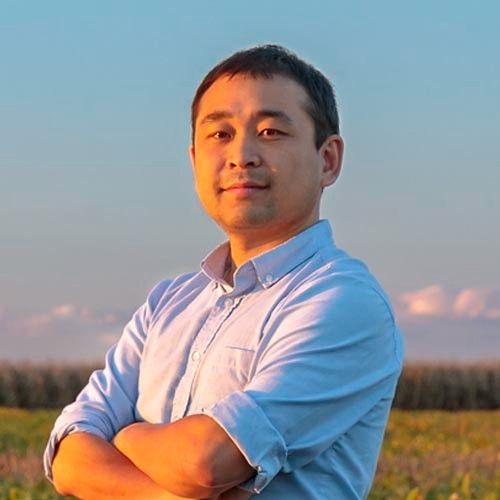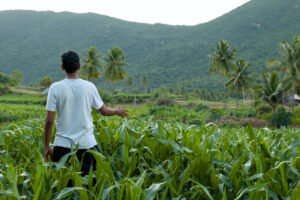At the tail-end of 2022, investment platform Foodshot Global unveiled the winners of its Groundbreaker Prize that recognizes scientists developing tools for more productive, sustainable farming. University of Illinois professor Dr. Kaiyu Guan was among those winners.
Pulling from a vast skillset that includes plant physiology, biogeochemistry, supercomputing, process-based modeling and machine learning, Guan has spent years integrating novel sensing and modeling technologies to bring better field insights to farmers.
His company, Habiterre, integrates data streams from remote sensors to create a comprehensive view of farmland. The system then uses these insights to simulate the agricultural environment via modeling to show crop growth, carbon cycles and nutrient dynamics. All of this is in the name of helping farmers make better decisions and, ultimately, making the food system more secure.
Habiterre spun out of the University of Illinois in 2019, but Guan has been working on the technology for far longer. Below, Guan [KG] and CEO Nick Reinke [NR] discuss that journey, as well as the choice to spend time proving out the technology before even thinking about a commercial launch.

AFN: Tell us a bit about your background and how you got involved in agtech.
KG: I did my PhD on global tropical forests and understanding the impact of agriculture on climate change. It was then I had a revelation that my technology, which was in the context of tropical forests, could apply to other crops. Even more exciting was, when you think about the global food security issues or climate change or sustainability, I saw huge opportunities.
I graduated from my PhD and moved to my postdoc at Stanford and started to work with two professors. One was really focused on global food security issues and climate change. The other professor focused on how to develop the best remote sensing technology for photosynthesis. Both were great training that really got me into the agriculture and understanding the opportunities and unresolved problems.
When you want to be an innovator, typically you either start a company instantly, ask for VC money to back you up. Or you wait a little bit, maybe become a professor, and use the research grants to really develop the ideas.
I chose the second path to became a university professor. For the past seven years or so, I’ve been with University of Illinois. We’ve been quite successful getting federal research grants and we have a big team, 30-plus people, including postdoctoral research scientists and PhD students.
We are working on some of the cutting edge topics related to sustainable agriculture — not only the productivity side but also the sustainability side of the system.
I’m also a Blue Waters professor, so we use one of the biggest supercomputers in the world.
AFN: And how did you go from professor to startup founder?
KG: About my fourth year [at University of Illinois], we filed for multiple intellectual properties of technologies that became mature. So I decided it was time to start a company. HabiTerre was started at that time as a university lab spin-off.
The company still has a very good relationship with the University of Illinois and with my research lab. I’m still a professor, but in the in the last two and a half years have been more active on the company side.
AFN: Nick, how did you get involved?
NR: Kaiyu and I arrived at the same place of wanting to make an impact through applied science.
I come from a family farming background in Dakota and worked with farmers in crop insurance and ag banking for about a decade. I saw this real need for technology, but also for farmer-facing tools that could help farmers engage in this climate space and understand what role they play and what opportunities they have.
I pivoted into the sustainability space, got an MBA at Johns Hopkins, consulted with some early-stage startups and then ultimately launched a carbon market at [Land o’ Lakes startup] Truterra. During my time there, I met Kaiyu.
At Truterra, we looked at a lot of different technologies to help scale the environmental marketplace around agriculture and remote sensing technologies, to minimize that data and reporting burden on the farmers. A lot of these solutions left a lot to be desired.

AFN: What was Kaiyu doing differently that attracted you?
NR: Kaiyu spent the time to build the science before launching the company. He really matured the technology inside of the lab environment before moving it out into a commercial environment. To me, that was absolutely the right way to do it. Scientific credibility underlying the accounting processes in the way that we track productivity and environmental impacts is critical to both credibility with farmers but also the credibility of the sustainability marketplace.
And then as Kaiyu a lot of grant funding went into “ground truthing” and training the technology on the lab side before creating pieces of IP licensed by the company.
So the technology was matured extensively through that process and through that grant funding, so then we didn’t have to mature the technology as much on the business side of things. It was already at a place where that combination of remote sensing capabilities, which are not just for observing farm management practices but also to train and refine the results of the overall modeling process. That’s what’s really unique about us.
AFN: Why was it so critical to mature the science before approaching commercialization?
KG: What we hope to provide is a solution that’s deeply based on long-term science, has been ingested into the most recent state-of-the-art technology like remote sensing, like AI. Sometimes that is challenging because [agtech] is a noisy, crowded space.
Once you really claim to be science oriented and tell farmers what to do, that’s a big responsibility. Putting that scientific standard our there is really important.
NR: It’s getting the science of technology to that critical point, where there is enough of a body of credible research underlying the technology before you try to commercialize it. What we see a lot of times in the startup environment is you get to a place where you get science that’s just “good enough” to create a product.
So that to me is kind of the the optimal marriage of something like the University of Illinois Urbana. Champaign, where can I use that and a commercialization effort like ours? So I think in a situation like this, it’s extremely valuable to make sure that that science gets far enough down the road before trying to commercialize.
This market is really taking off. Corporations are investing in improving their climate footprint and working with farmers in a meaningful way. So it’s really critical that this market understands the reality of changing practices on farms and just how different one farm or one region is to another.
AFN: What’s next?
NG: We’re really excited about investment coming from things like the USDA Partnerships for Climate-Smart Commodities, of which we’re honored to be a part of. Definitely, we see nothing but but growth and excitement on some projects that we’ll be unveiling in 2023.





